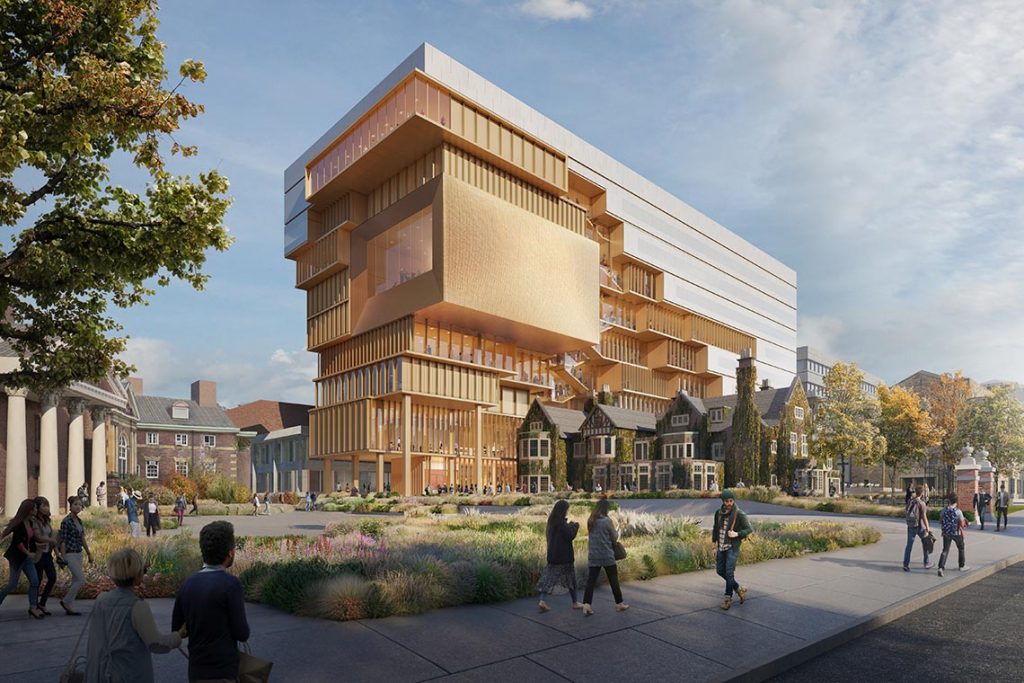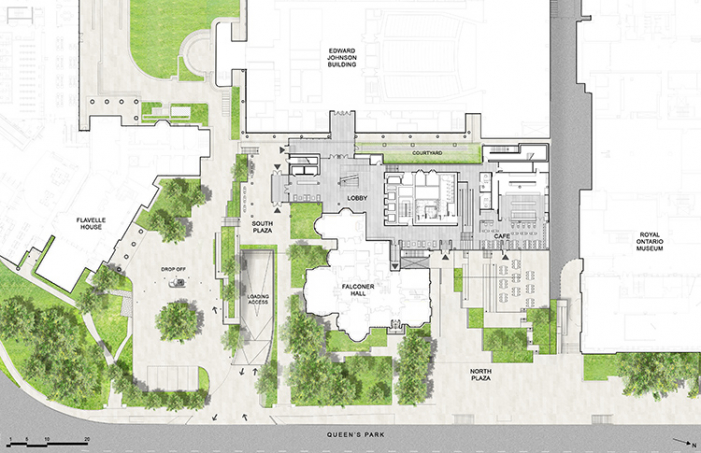Still no mandatory course for indigenous law, but the NCA might mandate it within two years
On Wednesday, March 20, the Faculty Council met for the sixth time this academic year. The following topics were discussed.

90 Queen’s Park Crescent
Dean Iacobucci started the meeting by commenting on the current status of the proposed nine-story building at 90 Queen’s Park Crescent, which will house the School of Cities and provide facilities for the Faculties of Arts & Science, Law, and Music. The Dean noted that in the current proposal, which is (optimistically) set to break ground in 2020, the northwest corner of Falconer Hall will be demolished and the remainder incorporated into the new building. Although the Dean was unsure if this would be beneficial for the law school’s operation, he said that the City has already restricted how much of Falconer Hall can be demolished and that the Faculty of Law will have rights to some of the space in the new building. However, there are still concerns with temporary space for law school programming during construction.

Black Law Student Recruitment
Students’ Law Society President Solomon McKenzie (3L) discussed the work the Black Law Students’ Association and Assistant Dean Alexis Archbold have been doing to address the underrepresentation of Black students in the Faculty. Their current plan is aimed at three specific areas: ‘pipeline,’ ‘admissions,’ and ‘academic success’. McKenzie commented that “part of the work that we are doing is signalling that U of T is a space that is taking Black student success seriously.”
Part of the work that we are doing is signalling that U of T is a space that is taking Black student success seriously.
—Solomon McKenzie (3L)
The pipeline aims to create programming focused on issues that Black students face before entering law school. Objectives include breaking down barriers to education and fostering interest in a legal career. Programming includes “Law in Action Within Schools”, “See Yourself Here”, and a strategic partnership with Leadership by Design. This year the BLSA, in conjunction with the Faculty, held its first-ever “Black Future Lawyers” event aimed at undergraduate students, with Justice Rita Maxwell as the keynote speaker.
For admissions, the Faculty aims to change how they review the personal statements of Black applicants by having at least half of the review panel consisting of members of the Black community. This change would not affect the admissions requirements. McKenzie noted that similar changes were made in the medical school admissions system, and they went from admitting “one [Black student] per year to a class of 13 the first year they rolled out this program.” The hope is to implement this change in two years once the pipeline has started to have a noticeable effect.
To improve academic success, supportive communities would be built to ensure that Black law students are succeeding while in law school. The belief is that students with strong social capital and strong connections to the legal community will develop a deeper cultural competence of the legal world and gain the tools they need to thrive in the law school environment. This program will involve alumni collaboration and will attempt to create a connection between Black students and alumni as early as possible.
Ontario Government Tuition Cuts
Dean Iacobucci briefly commented on the Ontario government’s tuition cuts, announced in late-January. He stated that he does not know how the cuts will impact financial aid, and the Faculty is still working through the implications of the budget changes with the Provost. He could not provide any predictions either, as “[Universities] don’t really know what the rules of the game are because the Province is, as someone put it, building the car as they are driving it.” [Editor’s note: The Dean put it that way at February’s Faculty Council meeting.]
Gender, Accessibility and Diversity Committee Update
Assistant Dean Alexis Archbold provided some updates on the Gender, Accessibility, and Diversity Committee. In the 2016–2017 academic year, the Committee surveyed JD and graduate students. The survey asked a series of questions related to students’ experiences at the law school, focusing on diversity issues, including socioeconomic background, disability, parent or caregiver status, English language proficiency, race, religion, age, sexual orientation, and gender. Since then, they have developed twenty-four recommendations for the Faculty of Law, and this year they prioritized three: (1) Develop a general student feedback and complaints process and post it on the website; (2) Develop an employer/recruitment student complaint process and post it on the website; and (3) Revamp the current diversity, equity, and inclusion page on the website.
Currently, the subcommittee has a final draft detailing the procedures for students to provide and make general feedback and complaints. This will be posted before the next academic year on the Faculty’s website. For the recruitment complaints process, the Committee undertook student consultation by developing and disseminating a survey for JD students. Conflicting views among the student body, concerns of anonymity, and a general lack of consensus complicated the student consultation process. As a result, the Committee could not determine a CDO recruitment complaint response policy. They recommended that the committee be tasked by the Dean to continue this project in the 2019–20 academic year.
Truth and Reconciliation Commission Implementation Committee Update
Professor Douglas Sanderson provided some updates on the Truth and Reconciliation Commission Implementation Committee (TRCIC). The TRCIC continues to maintain that it would not be feasible to implement a mandatory course in Aboriginal law, due to the lack of Indigenous legal scholars, on the one hand, and incoming students lacking suitable knowledge of Indigenous history necessary for meaningful discussions of Aboriginal law, on the other. Instead, the Committee recommends that the equivalent of a two-credit course (24 hours of instruction) be scattered throughout the 1L curriculum, such as in Property Law, Tort Law, and Constitutional Law. The Committee recognized that they might run into issues of academic freedom by imposing any mandatory curriculum requirement, but they were hopeful that professors would be proactive in integrating Indigenous Law topics within their first-year courses.
Dean Iacobucci, who sits on the Canadian Common Law Program Approval Committee at the Federation of Law Societies of Canada (FLSC), indicated that the National Committee on Accreditation (NCA) at the FLSC would likely require all law schools to implement a mandatory first-year course on Indigenous Law within the next two years. He said that the deans of the Canadian law schools were strongly opposed to this move; he maintained that any mandatory course should be the initiative of individual law schools and not the NCA.
Career Development Office Update
Neil Dennis, Director of the Career Development Office (CDO), ended the meeting discussing some of the CDO’s current work. Dennis discussed some statistics for the Class of 2018: 98% of those seeking articling positions were successful; 80.1% of the Class secured employment in Private Practice, 12.75% at Government and Public Interest, while 7% were Clerking; and 8.7% of the graduating class started their legal career in New York City. The CDO is still in the process of collecting information on graduation and summer employment plans for current law students. Thus far, 78% of 3Ls reported on their employment plans and, of those that have responded, 92% have secured articling positions. For 2Ls, 70% reported on their employment plans, with 80% of those reporting having secured summer employment. Dennis did not discuss this year’s 1L recruit employment numbers, but did note that, historically, U of T Law has secured roughly half of the available positions in the recruit.
Dennis did note that there were 90 positions available for the Faculty Hiring process, which include Research Assistantships, clinic jobs, and externally funded fellowships. Roughly 60-70 of those positions had been filled. Dennis specifically noted that, at the time of the meeting, only five of the seven Donner Fellowships have been awarded. Dennis said that the process of finding two additional students interested in working in public interest is ongoing.
Professor Mohammed Fadel asked “how many New York firms come to U of T Law for the recruit and how can we increase this number?” Dennis responded that six firms do OCIs and another six do resume-drops. Dennis stated that his goal for this year is to have more resume drops as “we [the Faculty] don’t have enough room for more than 6–8 employers on campus… and we would probably need to switch venues if there were more.”
Additionally, the CDO is currently looking at building relationships with Boston firms because Boston has a sizable legal market and Canadian JD graduates can write the bar exams in Massachusetts.





